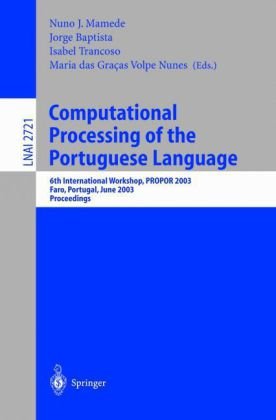

Most ebook files are in PDF format, so you can easily read them using various software such as Foxit Reader or directly on the Google Chrome browser.
Some ebook files are released by publishers in other formats such as .awz, .mobi, .epub, .fb2, etc. You may need to install specific software to read these formats on mobile/PC, such as Calibre.
Please read the tutorial at this link: https://ebookbell.com/faq
We offer FREE conversion to the popular formats you request; however, this may take some time. Therefore, right after payment, please email us, and we will try to provide the service as quickly as possible.
For some exceptional file formats or broken links (if any), please refrain from opening any disputes. Instead, email us first, and we will try to assist within a maximum of 6 hours.
EbookBell Team

0.0
0 reviewsSince 1993, PROPOR Workshops have become an important forum for re- archers involved in the Computational Processing of Portuguese, both written and spoken. This PROPOR Workshop follows previous workshops held in 1993 (Lisboa, Portugal), 1996 (Curitiba, Brazil), 1998 (Porto Alegre, Brazil), 1999 ´ (Evora, Portugal) and 2000 (Atibaia, Brazil). The workshop has increasingly contributed to bring together researchers and industry partners from both sides of the Atlantic. The constitution of an international program committee and the adoption of high-standard referee procedures demonstrate the steady de- lopment of the ?eld and of its scienti?c community. This can also be seen in the realization of the satellite workshop AVALON, which constitutes the ?rst evaluation campaign of Portuguese NLP systems. Each one of the 64 submitted papers received a careful, triple blind-review by the program committee. All those who contributed are mentioned in the following pages. The reviewing process led to the selection of 41 papers for oral presentation, 24 regular papers and 17 short papers, which are published in this volume. Theworkshopandthisbookwerestructuredaroundtheeightfollowingmain topics: (i) speech analysis and recognition; (ii) speech synthesis; (iii) pragmatics, discourse, semantics, syntax, and the lexicon; (iv) tools, resources, and appli- tions; (v) dialogue systems; (vi) summarization and information extraction; and (vii) evaluation.